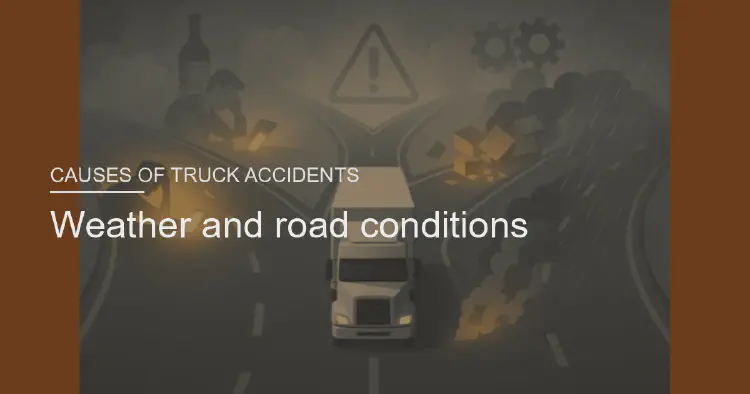Weather and road conditions
Even when truck drivers and companies follow regulations, external factors such as severe weather and poor road conditions can increase the risk of accidents. These conditions demand heightened caution from truck operators.
- Truck Accident Law Team
- 2 min read
Article 6 of 6 in Causes of Truck Accidents/

Weather and Road Conditions as Causes of Truck Accidents
Weather Hazards
-
Rain and Wet Roads
- Reduce traction and increase stopping distance.
- Risk of hydroplaning, especially for heavily loaded trucks.
-
Snow and Ice
- Cause reduced control and higher risk of jackknife or rollover accidents.
- Chains or special tires may be legally required in certain states.
-
Fog and Low Visibility
- Impairs drivers’ ability to see hazards and react in time.
- Increases likelihood of multi-vehicle pileups.
-
High Winds
- Can push trailers off balance, especially when empty or lightly loaded.
- High-profile trucks are particularly vulnerable.
Road Conditions
- Potholes and Poorly Maintained Roads: Can damage tires and suspension, leading to sudden loss of control.
- Construction Zones: Narrow lanes, sudden detours, and uneven pavement increase accident risks.
- Sharp Curves and Steep Grades: More challenging for trucks due to weight and braking demands.
Legal Considerations
- Drivers are expected to adjust speed and driving behavior according to conditions, even below posted speed limits.
- Failure to reduce speed in poor conditions can be considered negligence.
- Liability may also extend to government entities if road defects or lack of maintenance directly contribute to an accident.
Evidence in Litigation
- Weather reports, dashcam footage, and road maintenance records are often used to establish conditions at the time of a crash.
- Accident reconstruction experts may testify about whether the driver exercised reasonable caution.
Summary: Weather and road conditions can transform ordinary driving into a high-risk activity for large trucks. While these factors are sometimes beyond human control, truck drivers and companies are legally obligated to adapt their driving practices to ensure safety.
You might also like:
- Tags:
- Truck Accidents
- Truck Drivers
- Accident Reconstruction
- Road Conditions
- High Profile
- Speed Limits
- Evidence Litigation
- Government Entities
- Weather Road
- Reconstruction Experts
- Construction Zones
- Maintenance Records
- Weather Road Conditions
- Accident Reconstruction Experts
- Causes Truck Accidents
- Truck Drivers Companies
- Multi Vehicle Pileups
- Curves Steep Grades
- Poorly Maintained Roads